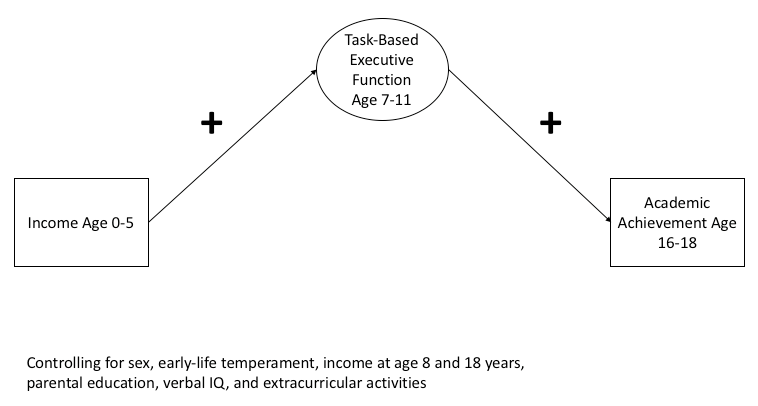Boosting Executive Function May Help Close Income-Based Achievement Gap
By LillyBelle Deer, Paul Hastings, and Camelia Hostinar, UC Davis
Children growing up in economically disadvantaged contexts are at risk of underperforming academically. Why is this? One explanation may be underdeveloped ‘executive function’, an important collection of attention-regulation skills. Executive function is malleable in childhood, indeed—interventions have been effective in improving it, especially among children facing adversity. In a recent study, we set out to examine whether early-life family income predicted long-term academic achievement, and to investigate the role of executive function in explaining this association. We found that task-based executive function played a significant role in explaining the association between early-life family income and later academic achievement. This suggests that childhood executive function may play an important role in perpetuating income-based educational disparities. It also identifies childhood executive function as a valuable target for policy aiming to reduce such disparities.
Key Facts
- Income-based disparities in academic achievement emerge early in life and persist into later childhood and adolescence.
- Executive function, an important collection of attention-regulation skills, is malleable in childhood.
- Boosting executive function among disadvantaged children in middle childhood may help close the achievement gap between them and their better-off peers.
Income-based disparities in academic achievement emerge early in life and persist into later childhood and adolescence.[1] By adulthood, those from low-income backgrounds complete less schooling overall.[2] Because the academic- achievement gap between low-income youth and their financially better-off peers often translates into a gap in adult earnings and overall socioeconomic status, limited education contributes to the transmission of socioeconomic disadvantage to the next generation.[3]
To promote academic success in students from economically disadvantaged households effectively, it is crucial to find the developmental pathways through which family economic circumstances affect children’s academic outcomes. Some of these pathways, such as executive function, may be more amenable to intervention than others. Executive function reflects neurological activity that allows children to exercise increasing levels of cognitive control over their responses to environmental stimuli.[4] It enables them to focus, resist distraction, tolerate frustration, reflect, and plan ahead.[5]
Chronic exposure to poverty-related stressors—neighborhood violence, family chaos, racial discrimination, noise, pollution, and so on—alters the neurobiological systems that support executive functions. This shifts children from a more “reflective” to a more “reactive” pattern of responding.[6] This in turn leads children from homes with low financial resources to be seen by their parents or teachers as less competent in various aspects of self-regulation and to exhibit poorer performance on task-based measures of inhibitory control, working memory, and attention shifting.[7] It follows, then, that intervening to improve executive function skills can improve academic achievement for children from high-poverty schools and thereby reduce the achievement gap.[8] With this in mind, our study[9] focused on executive functions during middle childhood because these skills become consolidated during middle childhood and adolescence.
Assessing the Role of Executive Function
We drew on data from the Avon Longitudinal Study of Parents and Children (ALSPAC). This ongoing birth-cohort study aims to follow more than 14,000 participants from birth into adulthood, with the goal of understanding the role of environmental and genetic factors in shaping a wide range of developmental and health outcomes. ALSPAC provides a rich dataset built from many waves of data collection, including questionnaires completed by children, parents, and teachers; administrative records; observational data; clinical assessments; and biological samples.
The first measure taken was total family weekly income, assessed through maternal self-report when the child was 33 months and 47 months of age. The second measure was academic achievement at age 16-18, including, for example, application and acceptance to university. The third measure was executive function, assessed at multiple time points and from multiple sources between ages 7 and 11. Executive function was assessed in the clinic using three subtests of the Test of Everyday Attention for Children when the study children were 8 and 11 years old; by the Counting Span Task when the study children were 10 years old; by parent report when the children were 8 years old; and by teacher report during school years when the children were 7 or 8 years old, and when they were 10 or 11 years old. We used these measures to test the mediating role of childhood executive function for the link between early-life family income and late adolescent academic achievement.
Executive Function Mediates the Link Between Income and Achievement
As expected, lower early-life family income predicted lower academic achievement in adolescence. Meanwhile, among all our measures of executive function, we found significant associations. When examining the associations among executive-function measures and early-life income, the Opposite Worlds task (a measure of cognitive inhibition), Counting Span (a measure of working memory), and the teacher-reported measure of behavioral inhibition showed the strongest associations with indices of early-life income.
Our results point to executive function skills as an important factor in the relation between early-life income and academic achievement during adolescence (Figure 1). We found that low early-life income predicted poorer task-based executive function performance, which in turn predicted poorer academic achievement. Importantly, we also found that early-life family income continued to predict academic outcomes via executive function even when we statistically adjusted for family income at ages 8 and 18 years. This suggests a potentially important and independent role for early experience in setting up the foundation for later academic achievement.
Figure 1: Executive Function Skills in Middle Childhood as a Mediator between Early Income and Later Academic Achievement
Improve Executive Function, Close Achievement Gap
Executive function allows children to shift and maintain attention as needed during a lesson, remember classroom rules, inhibit inappropriate impulses, hold and manipulate items in working memory to aid reasoning, and use planning to solve problems effectively. Our study found that executive-function skills are important predictors of academic success. It thus supports the role of executive function in middle-to-late childhood as a foundation for long-term academic success, and as a mediator between early-life family income and academic achievement.
Our findings support the value of policies and intervention programs that aim to improve executive function to reduce income-based disparities in academic achievement. Indeed, boosting executive function in the preschool years may help close the achievement gap between poor children and their better-off peers. Our study also highlights executive function between the ages of 7 and 11 as another possible target, with potentially far-reaching benefits for academic achievement.
LillyBelle Deer is a PhD candidate in the Department of Psychology at the University of California, Davis.
Paul Hastings is a Professor of Psychology at the University of California, Davis.
Camelia Hostinar is an Assistant Professor of Psychology at the University of California, Davis.
References
1. Duncan, G. J., Magnuson, K., & Votruba-Drzal, E. (2017). Moving beyond correlations in assessing the consequences of poverty. Annual Review of Psychology, 68, 413-434.
2. Duncan, G. J., Ziol-Guest, K. M., & Kalil, A. (2010). Early-childhood poverty and adult attainment, behavior, and health. Child Development, 81, 306-325.
3. Duncan, G. J., Yeung, W. J., Brooks-Gunn, J., & Smith, J. R. (1998). How much does childhood poverty affect the life chances of children? American Sociological Review, 63(3), 406-423. doi: 10.2307/2657556
4. Munakata, Y., Snyder, H. R., & Chatham, C. H. (2012). Developing cognitive control: Three key transitions. Current Directions in Psychological Science, 21, 71-77.
5. Zelazo, P. D., Blair, C. B., & Willoughby, M. T. (2016). Executive Function: Implications for Education (NCER 2017-2000). Washington, DC.
6. Blair, C. (2010). Stress and the development of self-regulation in context. Child Development Perspectives, 4, 181-188. doi: 10.1111/j.1750-8606.2010.00145.x
7. Sarsour, K., Sheridan, M., Jutte, D., Nuru-Jeter, A., Hinshaw, S., & Boyce, W. T. (2011). Family socioeconomic status and child executive functions: The roles of language, home environment, and single parenthood. Journal of the International Neuropsychological Society, 17, 120-132. doi:10.1017/S1355617710001335
8. Blair, C., & Raver, C. C. (2014). Closing the achievement gap through modification of neurocognitive and neuroendocrine function: Results from a cluster randomized controlled trial of an innovative approach to the education of children in kindergarten. PLoS One, 9(11): e112393. https://doi.org/10.1371/journal.pone.0112393
9. Deer, L. K., Hastings, P. D., & Hostinar, C. E. (2020). The role of childhood executive function in explaining income disparities in long-term academic achievement. Child Development, 91(5), e1046-e1063. doi:10.1111/cdev.13383













